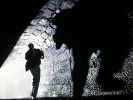Eye For Film >> Movies >> The Trial (1962) Film Review
'Kafka-esque' is a word describing a paradigm that probably goes beyond its genesis in the work of that author. Orson Welles is not fanatically faithful to Kafka's story. But he is probably more faithful to the spirit of it than any other 'Kafka' movie you could imagine. Welles – who felt this was the best movie he ever made – evokes the feeling of menacing, disorientating bureaucracy, of the senselessness of our existence, of inexplicable and inescapable threat. He pegs this to the Kafka story. Energises it with the frightening paranoia of Anthony Perkins (fresh out of Psycho). Renders it with one of the most remarkable dystopian landscapes ever created. And – what I like best – maintains the timeless alarm call of Kafka's work, allowing it to pass to successive generations.
McCarthyism. The Spanish Inquisition. Nazi incarceration of Jews. Whether pre- or post-Kafka (or Welles), any of these seem to fit his allegory. Seen in the UK in 2008, it could have been made specifically to address the modern obscenity of 'detention without charge'. Even more than Guantanamo Bay.

Anthony Perkins is Josef K, rudely awakened one morning by police. They don't tell him what he's charged with. They write down everything he says. Feed it back to him and suggest hidden meanings. Why did he call a phonograph a 'pornograph'? Still trying to wake up properly, gather his thoughts and decide how to handle it, Josef goes from righteous nothing-to-hide to panicky what-the-fuck-is-happening? He is told he won't be detained. Yet. His workmates are informed. His neighbours are involved.
Those familiar with Perkins' secret homosexuality may infer added 'meanings' from the film such as societal conspiracies to vilify gay men.
Jeanne Moreau makes an entrance with impact. She is Perkins' neighbour-tenant. No sooner have we been enveloped by Perkins' strong stage presence, his nervousness bordering on hysteria, than Moreau creates another new world. She lives next door. Comes in late. A dancer at a nightclub. A stripper? A whore, maybe? She exudes the confidence of the often semi-drunk. A nervous neighbour is putty in her hands. "You're not getting any funny ideas are you? Just because I knocked on your door." She is drawing him into her room. But notice how she plants the idea – much like the police are doing. It's as if someone says, "Don't think of the colour blue!" And immediately you do just that.
Moreau is all woman, exuding an almost feral sexuality. She soon has Perkins rolling around on the bed with her. But, as soon as he mentions his 'case,' his guilt and fear transfer to her. She throws him out. Her sister blames him for the misfortune that then befalls her.
The Trial transits rapidly from film noir to surrealism to the uniquely Kafka style of portraying things. The trenchcoat and manner of the police in Josef's apartment are pure noir. The film was released at a time when black-and-white could still be used without immediate and obvious allusions to a bygone era. The noir-ish tone fits perfectly with the mystery that surrounds Josef's 'crime.'
Many other adaptations work equally well. The office where Josef works is like a large scale version of the rows of mindless underlings in The Apartment (1960). It pits the individual (Josef) against the corporate (invisible bosses who run things) in a way entirely suited to Kafka's essential meaning. Later, there is a shot where Josef wanders through malnourished and badly-clothed people, each with a number around their neck. Welles suggested that if The Trial had been written post- Auschwitz, Kafka might have included such a scene.
As Josef's world dissolves, Welles soon abandons any real pretence of an integral reality. Each time he opens a door, it unlocks a new psychological horror. Men being beaten put tape over their own mouths, considerately, so as not to disturb him with their screams. Welles adds Freudian layers to the story as each nubile and sexually available woman turns femme fatale, secretly trying to trick poor Josef. Romy Schneider even conspires with him as part of the conspiracy against him.
"The first chance you get," he is told, " you are to make your confession. Till you do that there is no hope of getting out of their clutches." Does that mean there is some hope if he does? Or is it all a conspiracy?
My complaints with this film are that it is resoundingly negative and meanders on a bit too long. The desultory episodes in which Josef is questioned all make the same point, and one that does not perhaps justify two hours of the same intensity. While it's visually stunning, the sound is often poor. But it is a remarkable tour-de-force on the limited budget Welles had. Film fans and academics will continue to debate the extent to which it can be called his greatest film.
Reviewed on: 11 May 2008



















